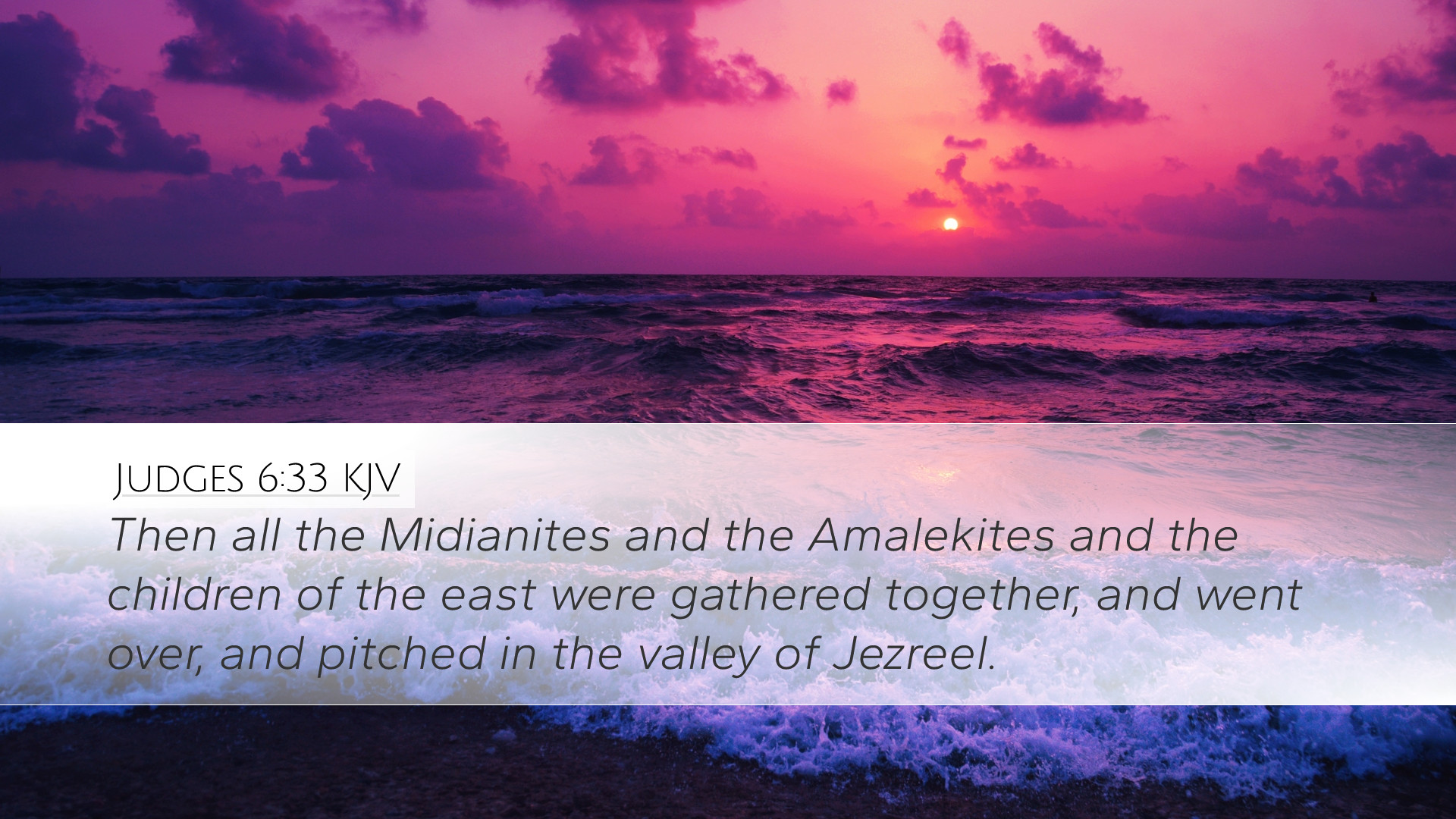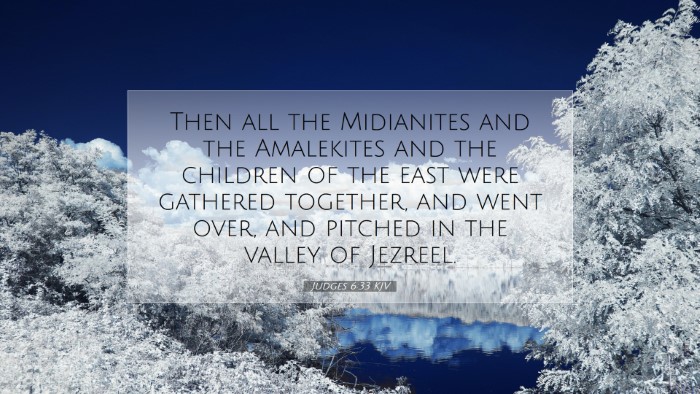Commentary on Judges 6:33
Judges 6:33 states, "Then all the Midianites and Amalekites and the children of the east were gathered together, and went over, and pitched in the valley of Jezreel." This verse sets the stage for a critical moment in Israel's history, where divine providence intersects with human action. Here, we draw insights from noted public domain commentaries to provide a comprehensive understanding of this passage.
Contextual Overview
This verse is situated within the narrative of Gideon, a figure who is called by God to lead Israel against their oppressors. The backdrop of this scripture is the period of the Judges, a time characterized by cycles of apostasy, oppression, repentance, and deliverance.
Historical Significance
According to Matthew Henry, the gathering of the Midianites, Amalekites, and others signifies a formidable coalition against Israel. This moment exemplifies the recurring theme of Israel's vulnerability due to disobedience and the cyclical nature of their struggles. The convergence of these adversaries represents not only physical threats but also spiritual ones, as Israel's suffering is a direct consequence of their idolatry and departure from God.
Spiritual Themes
Adam Clarke highlights the thematic element of divine response to the plight of His people. The gathering of Israel's enemies can be seen as a test of faith for Gideon and the Israelites. In their desperation, they are called to reflect on their covenant relationship with God, which serves as a pivotal element in interpreting this narrative. Clarke emphasizes the necessity of reliance on divine strength rather than mere military means.
Symbolism of the Valleys
The term "valley of Jezreel" carries significant meaning. As noted by Albert Barnes, valleys often symbolize areas of conflict and vulnerability. This particular valley is not merely a geographical location; it is emblematic of the spiritual battles that the Israelites must face. The choice of this setting foreshadows the impending confrontation where God’s empowerment will be decisive. The valley's historical context as a battlefield adds weight to its representation, indicating the struggle between good and evil.
Divine Preparation for Deliverance
In the unfolding of this narrative, we see God's providence at work through Gideon. As Matthew Henry points out, it is critical to recognize that God often uses unlikely instruments to accomplish His purposes. Gideon himself is portrayed initially as hesitant and fearful, underscoring the notion that God equips those He calls. The assembly of the enemy forces also serves a dual purpose; while it appears to threaten Israel, it also sets the stage for a powerful deliverance that showcases God’s sovereignty.
Call to Faith and Action
The events described in this verse compel the readers, particularly pastors and theology students, to reflect on the nature of faith amid daunting circumstances. Adam Clarke suggests that struggles, like those faced by Gideon, prompt individuals to rise in faith and action, leading to divine intervention. This highlights a key lesson for modern believers: in times of crisis, returning to God in prayer and seeking His guidance is paramount.
Application for Believers Today
- Understanding Challenges: Just as Gideon faced overwhelming odds, contemporary believers must recognize that challenges serve to deepen their faith.
- Embrace Divine Calling: The call of Gideon illustrates that God can use anyone, regardless of their initial state or feelings of inadequacy.
- Active Engagement in Spiritual Warfare: The gathering of adversaries in Jezreel prompts believers to engage in spiritual warfare, relying on God’s strength rather than their understanding.
- God’s Sovereignty and Deliverance: The assured deliverance through Gideon reassures believers that God’s plans ultimately prevail against any formidable foe.
Conclusion
Judges 6:33 serves as a reminder of the intersection between human frailty and divine power. In the historical and spiritual context of this passage, believers find a profound template for understanding the trials they face. The insights from public domain commentaries by Matthew Henry, Albert Barnes, and Adam Clarke enhance our appreciation of God's faithfulness, the necessity of faith in action, and the importance of relying on divine strength in facing life’s battles.


